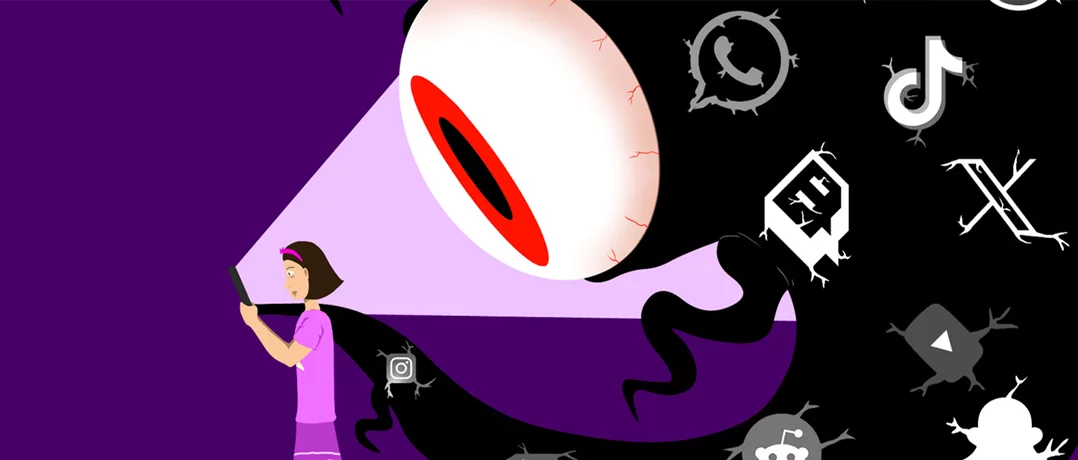Lebanese experts warn that children’s growing social media addiction demands shared responsibility to protect their mental and social well-being.
Growing Up Online

In Lebanon, children are growing up in a world where social media is no longer a novelty but a constant presence shaping how they play, communicate, and perceive themselves. What began as a tool for entertainment and connection has evolved into an addictive force, raising urgent questions for parents, educators, and society alike: who bears responsibility for guiding children through this digital maze, and how can we protect their psychological, social, and academic well-being?
A shared responsibility
Psychologist and psychotherapist Randa Wehbe tells The Beiruter that parents remain the first line of defense.
“A child’s first exposure to values, habits, and digital limits begins at home,” she explains. While schools can educate and society can regulate, Wehbe insists that effective protection depends on collective responsibility. “It’s not about control, but co-responsibility. When parents collaborate with schools, and society provides safer platforms, children are more likely to develop a healthy digital balance.”
The toll of harmful content
The risks are far from abstract. Children today are exposed to violent, sexual, and otherwise inappropriate content with lasting consequences. “Cognitively, this content can distort a child’s understanding of reality, relationships, and self-image,” says Wehbe. “Emotionally, it can trigger anxiety, fear, or premature curiosity about adult topics. Socially, children may imitate harmful behaviors, struggle with empathy, or compare themselves unfavorably to peers eroding their self-esteem.”
Early exposure, she warns, can disrupt the natural rhythm of emotional and moral development. Yet the warning signs are often misread. Difficulty concentrating, irritability, fragmented attention, or withdrawal from real-life social settings may be dismissed as mere laziness or defiance. “What we see as misbehavior is often digital overstimulation and emotional fatigue,” Wehbe notes.
Life in the digital age
The influence of social media often manifests in subtle yet pervasive ways. Many children experience “phantom notifications,” checking their phones even without alerts. Late-night scrolling disrupts sleep, fragmented focus impacts learning, and anxiety becomes a daily companion.“The digital environment creates a cycle,” Wehbe explains. “Children seek validation online, but this comes at the cost of real-world connections. They may begin to define themselves through likes and comments rather than genuine experiences.”
Parental modeling matters
According to Wehbe, parental behavior is as crucial as parental rules. “Children learn digital habits through modeling, not lectures,” she says. “When they see parents constantly scrolling or reacting emotionally to online content, they internalize that phones deserve constant attention. Conversely, when parents demonstrate balance and purpose, children learn that devices are tools not masters.”
Healthy guidance, she adds, should blend supervision with trust: set screen-time limits, discuss online experiences openly, and explore digital platforms together. As children mature, autonomy should increase reinforcing the principle that freedom grows with responsibility.
Long-term consequences
Unchecked overuse leaves deeper scars. “Social media addiction rewires the brain’s reward system,” Wehbe warns. “It increases dopamine sensitivity and reduces tolerance for real-life satisfaction.”Adults who were heavy users as children often struggle with short attention spans, emotional regulation, dependency on approval, and escapism. Yet, the outlook isn’t entirely bleak. “The brain is adaptable,” Wehbe explains. “If children maintain meaningful offline relationships, they can learn to navigate the digital world responsibly.”
Finding balance
Social media is not inherently harmful. When used wisely, it can inspire creativity, expression, and connection. But awareness, dialogue, and balance remain essential. “Children need to learn that the virtual world is part of life not a substitute for it,” says Wehbe. “If parents, schools, and society work together, children can grow up resilient, thoughtful, and grounded able to enjoy technology without letting it define them.”
In a country where families already face immense political, economic, and social pressures, Lebanon’s digital challenge may seem like yet another burden. But with structure, empathy, and open communication, it can become an opportunity one that equips a new generation to thrive both online and in the real world.



